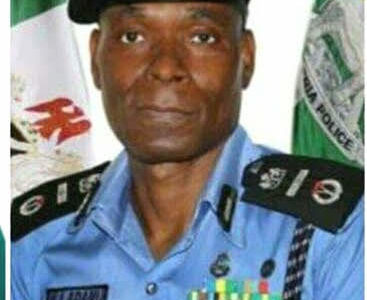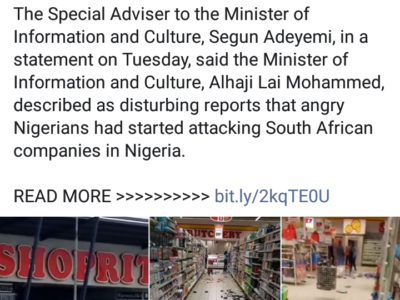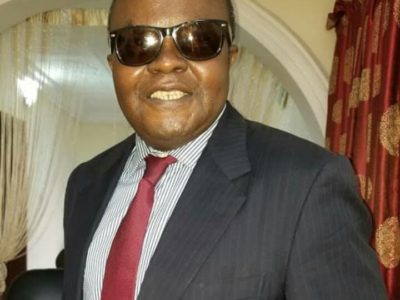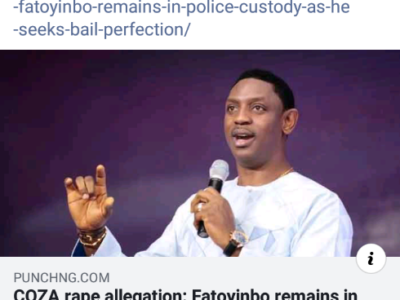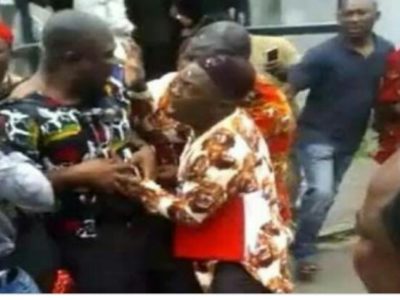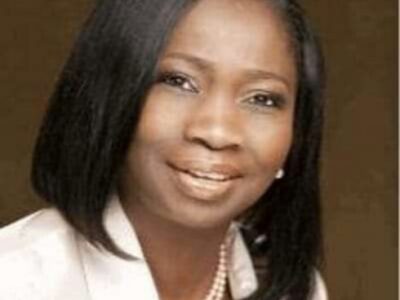Breaking: as if a curse follows the Nigerian police
Daily Trust reports that three police men, suspects die in motor accident.
According to Daily Trust, "Three police officers said to be working under DCP Abba Kyari and some arrested suspects have died in a ghastly motor accident few kilometers from where three police men were killed by soldiers along Ibbi-Wukari road in Ibbi local government area of Taraba State at about 6 pm, on Monday."
It was the same IRT unit headed by DCP Abba Kyari, which lost 3 policemen to soldiers' bullets last month.
Daily Trust’s finding revealed that "the police officers were escorting the suspects to the Area Command in Wukari when the driver of the police vehicle they were traveling lost control and somersaulted".
An eye witness, Mallam Kasimu Dauda, told Daily Trust via Telephone that the accident occurred at a village few kilometers from where the 3 police men and 2 civilians were killed by soldiers last Month. He said the victims were part of DCP Abba Kyari’s team that came to Ibbi, following the killing of 3 Police men and 2 civilians and were left behind to conduct further investigation in the area. Mallam Kasimu Dauda said the victims were escorting the suspects and some guns recovered in the area when the accident happened.
The police spokesperson in the state, DSP David Misal, who confirmed the incident via a text message to Daily Trust reporter, however said only one police man died in the accident. He wrote: “A vehicle with some police detectives, on special investigation, along Ibbi-Wukari road had a fatal accident as a result of bad tyres and it led to the death of a police officer while others sustained injuries and are currently receiving treatment”.
A big disappointment to Africa
The South African government has been a disappointment to Africa, just as Nigeria. But let's talk about South Africa.
In the 70s and 80s, Nigeria led the world in the fight to end the white supremacist regime in South Africa, known as the Apartheid. Then Nigeria still had the muscle to flex in the continent, not now that Nigeria has become a mockery.
It was natural, therefore, that upon the end of Apartheid, Africans would be hopeful that South Africa, led by former freedom fighters, would be a blessing to the continent. But unfortunately, the reality has been the opposite. The post-Apartheid South Africa has been a terrible let-down. It has been like an elephant giving birth to a mouse.
Nowhere else has this been more demonstrated than in the xenophobia that has gripped the South African society for a number of years now. That the South African civilian population, particularly the blacks, would be attacking and killing black African immigrants in their country must be blamed on the Government of South Africa. The black leaders of South Africa have failed the basic test of leadership, which is a terrible irony.
If the South African leaders were not like drunken idiots, they would have known the long term implications of these xenophobic attacks. For one, South Africa will not be able to attract sufficient black immigrants it would need to soften white domination of their economy and their professional class. Second, it will trigger return hatred of South Africans in other African countries, thus denying the South African economy the opportunity to expand into markets within the continent.
The evils of xenophobic violence in South Africa was mildly revealed yesterday when Nigerians retaliated by attacking and looting South African businesses in Nigeria, often their biggest markets in the world. That hopefully will send a message to South Africa. No group will fold their arms and watch their kit and kin slaughtered senselessly with impunity. And as the South African police are too nice to those killing Nigerians, let Nigerian police borrow that gentle disposition when dealing with Nigerians attacking South African businesses.
Despite all this, the situation is not out of control yet. The two governments should double their efforts. The emphasis should not be on how to avenge the Nigerians killed. Rather, it should be on how to protect thousands of Nigerians still in South Africa, who need to remain in that country. Also, since not every African country has the clout as Nigeria, it will be proper for Nigeria's effort to aim to end xenophobia against all Africans in South Africa. There must be an end to these spates of violence.
The process will not be complete unless there is justice for the victims of the past and present attacks and punishment for people known to be involved in the attacks. For those, whose shops were looted or who lost their relatives in these attacks, there should be adequate compensation to be paid by South African government.
Both governments must understand that both the xenophobic violence in South Africa and retaliatory violence reported in Nigeria are as a result of government failure to act preemptively.
(The picture below came from Punch Newspapers showing one of Shoprite Stores looted in Nigeria in relation to xenophobic violence in South Africa).
Now my personal opinion on Bobrisky by Dr. Greg (a Rambo)
Every society has its established customs and standards of acceptable behavior. Their cultures and norms took decades and centuries to form, and once formed it takes decades and centuries for them to disappear.
The age of the internet and social media has brought the world closer and cultures of one society become easily enmeshed with the cultures of other societies. Just as religion was used to spread the cultures of the more powerful societies to the weaker societies, technology is today being used to spread the western cultures to the weaker countries of Africa. Indeed, the African cultures are being rapidly overwhelmed by the influence of foreign cultures.
Naturally, societies and cultures will try to resist external influences. But as history has repeatedly shown, the culture that is backed with superior military power, more advanced technology and greater economic power will prevail over the cultures of those of the weaker powers. It is not a matter of which culture is superior. There is nothing like superior or inferior culture. It is all a matter of power and effectiveness. The creation myth in the book of Genesis is not superior to the legend of Odudua, which is Yoruba equivalent of Genesis. But the Yorubas lacked the means of getting other cultures to accept their creation myth. In fact, they lacked the power to retain their own myth and save it from those who came with the Bible and Koran.
It is against that historical background that we must analyze the role of Bobrisky and the role of the Nigerian police and officials. You must accept that both are agents of history or the instruments through which the historical process of clashes of cultures manifest in this instance. To understand this, you must first stop being emotional about it. Understand that the individuals involved now are mere vessels through which something greater is taking place. When Bobrisky began to experiment with dressing like the opposite sex, he wouldn't have known it would take him so far. And nobody in government knew he could become famous in the process.
The problem in culture clashes is that the new culture is always impatient. It comes in a little too early and the old culture lingers a little too long. Bobrisky is guilty of arriving too early on the stage and the Nigerian authorities are guilty of taking too long to accommodate the new. Bobrisky will fight with the weapon of his constitutional right to be different in his personal and private life. Your rights to dignity and privacy include your right to dress as you like. And the authority will come armed with the laws that are used to regulate culture, customs and morality.
The surprising thing, however, is that the Nigerian authorities have refused to identify the specific laws that Bobrisky violated. The closest they came to that was that his planned birthday party would amount to breach of peace because "those offended by his lifestyle might object to his party". Quite a lame excuse! Why didn't they offer to provide security to Bobrisky then? Instead of using clear legal basis to pursue, Bobrisky, they are inciting public outrage against Bobrisky. That means that the government is using mob and jungle justice against Bobrisky.
Did you get that? Did you try to think about that or did you just get emotional and react emotionally? Why didn't they arrest him? Because they have no particular offence they could point to. Why did they not charge him to court? The same thing. So, they decided to mobilize a jungle justice squad and a culture and morality police force against him.
For the avoidance of doubt, it is not an offence for a man to dress like a woman and it is not an offence for a woman to dress like a man. (But the police occasionally arrest women in Abuja for dressing in trousers (ie like men) same allegation against Bobrisky). It is not a crime for a man to wear wig or for a lady to have low cut. None of those things done by Bobrisky is a crime. They tried to link him to homosexuality. But they have no evidence. All they have are innuendos. The police carefully avoided arresting Bobrisky because they knew he will sue them successfully.
By the way, why is the Nigerian police selective in law enforcement? Aren't they supposed to enforce all the laws? What about the law against kidnapping? What about the laws against terrorism and banditry? They left those and chose the soft target. The same police that are so eager to protect your culture is not interested in protecting your lives? And you are falling for that, just like a zombie. Good luck.
Bobrisky should be commended for his courage in risking public outrage to express himself differently. He is also a talented entertainer. We just hope his sense of timing would not get him into more trouble.
What crime did Bobrisky commit?
On 30th August, 2019, a team of police officers from Lagos State Command invaded two locations in Lagos where Bobrisky, a famous cross-dresser, was to have his birthday events. The aim of the police was to disrupt the events and prevent the intended party from holding. And the police succeeded. This leads DPA News to ask questions.
What crime did Bobrisky commit under Nigerian law? None! If he had committed a crime, a court would have issued a warrant for his arrest, he would have been arrested and he would have been charged to court. That is what the law says. But none of this could happen because Bobrisky committed no crime and had no intention to commit any. He threatened no crime and there are no real victims that were injured by him.
The only problem is this: If one takes Bobrisky seriously, one will find that he has an unusual lifestyle - which is a man dressing and looking like a beautiful woman. However, if one does not take him seriously, one will find him an interesting entertainer who creates fun and amusement by acting harmlessly in an unusual manner.
Bobrisky did not commit a sexual offense. He did not have sex in public, which would have offended the anti-decency laws. He did not engage in public nudity. He did not have sex with either man or woman which would have raised the issue of prohibition of same-sex romance. We do not even know whether Bobrisky has a lover or not. So, what offense did this man commit that warranted, not his arrest, but denial of opportunity to have his birthday party?
What is clear is that one government official has become a zealot and has turned himself into a moral police to judge how we should feel about others' private lifestyle. If we allow Mr. Otunba Runsewe to do this and get away with it, his brand of moral crusade will get to a point where women will be stopped from putting on trousers because that means they are dressing like men, and worse.
What this case shows us is that whatever government office Mr. Runsewe is representing has no further relevance and should be shut down to save taxpayers money. And one hopes that Bobrisky will approach the courts to enforce his rights.
Who is the real threat: Bobrisky or Otunba runsewe?
In light of the following story in the media, we were forced to ask the captioned question.
Bobrisky will no longer be allowed to practice his "Girlish & Mumu Lifestyle" in Nigeria, as public official nabbed his activities "A National Disgrace"
Director-General of the National Council for Arts and Culture, Otunba Olusegun Runsewe, has vowed to deal with popular Nigerian male Barbie, Okuneye Idris Olarenwaju, widely known by many as Bobrisky.
He made the disclosure in an interview with Vanguard. According to him, Bobrisky will not be allowed to practice his ways anymore in Nigeria. His words; Bobrisky is a national disgrace. He started by selling and using bleaching creams, now, he has grown boobs, bums and hips.
If a Bobrisky is doing well with his immoral lifestyle, how do you convince Nigerian youths to do the right thing? Bobrisky has the right, but not within the Nigerian environment.
There are others like him, but they live outside the country. If we don’t address Bobrisky as early as possible, he will form a team that will spread like wildfire.
This will result in a lot of suicide cases, because the typical Nigerian parent would not want to see their child become a Bobrisky.
It’s not an entertainment issue, it’s a war to save Nigeria for a better tomorrow. If you start this kind of war, you are bound to be attacked.
”My job is to preserve and protect the culture of this country. It would be unfair for me to be silent on this. You now find male prostitutes by the roadsides.
A popular Nigerian recently paid an unexpected visit to his son in England only to discover that the son is a gay leader. The man was brought back to the country on a wheelchair.
I’m talking with the strength of information and authority. I have information that over twenty-three Nigerian boys are already starting Bobrisky’s brand.
Immediately we started the war, they pulled out because we are going to get them arrested. They cannot destroy this country."
When you meet Emeka Ugwuonye, what will you say to him?
I had to present this question to our members. Yes, you will see Emeka Ugwuonye again soon. If you know Nigeria's legal system, you will understand what happened. He attacked the Nigerian police the way nobody does from within the country. Ugwuonye was determined to expose the evil within the police.
They warned and threatened him. But he didn't stop. When he tried to expose the billion naira industry behind the Abattoir secret prison in Abuja, he went too far. The option was to assassinate him or to find a less messy way to get rid of him. The only way they knew was to charge him with murder and armed-robbery on the same case he accused the police of cover-up. How smart!
Emeka knew the police would try that because they warned him. But it was good they chose that option instead of assassination. A police prosecutor warned Mr. Tosin Ajaomo, one of Ugwuonye's lawyers that they would charge Ugwuonye with the murder of Chacha if he kept accusing the police of cover-up in the case. But the DPA Founder laughed it off. He said he never thought the police could be that daft. He knew the police could try something bizarre, but he believed that the court would protect him against the police. That was where he miscalculated.
More than 90% of criminal cases in Nigeria is about bail. Six other courts granted Ugwuonye bail each time the police charged him to court. He thought that would always be the case. But the current court denied him bail.
Even the police officers told Ugwuonye that it would just be a matter of time, that this was just to slow him down, since he refused to listen.
So, we all know that he will be out. The game will be over at some point. During the last time we visited him in prison, we talked about his coming out. He shared with us the good and bad of being in prison. What hurts him the most is the heavy toll it has had on his family. He is not their for his children or for his mother. The good side of it is quite huge. His view of Nigeria has been sharpened further. His understanding of his work is clearer now. He is more determined and better prepared to save this country from the abyss it has plunged into. He has no bitterness towards the police. He just wants to reform the police system in Nigeria.
So, now, I ask: If you have 5 minutes of a face-to-face meeting with Emeka Ugwuonye, DD, Founder of DPA, what will you say to him, apart from reporting Rambo?
The case against the COZA Pastor may be more serious than previously thought
For the police to drill Pastor Abiodun Fatoyinbo for over 8 hours straight, it tells you they have something strongly incriminating against him. The interrogation team was led by a senior female police officer in the rank of Assistant Commissioner of Police, ACP Adaku Anya.
Fatoyinbo was questioned at the Force Criminal Investigation Department, Garki Area 10, Abuja. Two other pastors from COZA were questioned the same day.
There is a wholly different approach to this investigation, which shows rare professionalism on the part of the police. The police interviewed many other witnesses before getting to the suspect. That ensured they had strong background material before they finally got to interrogate him.
What is the kind of evidence that the police would find interesting in a 20-year old rape case? The DPA legal team has analyzed the case and has identified the following possible evidence.
(1) The victim's diary, if any. Some people keep daily or weekly or monthly diaries of what happens in their lives. If this lady has kept such diary, her record of the rape when it occurred will be strong evidence that she didn't just make it up.
(2) Testimonies of people like friends and relatives she spoke to when it happened and any notes and diaries those people took then will be relevant.
(3) Any further communications between the pastor and the the victim during which the pastor apologized or tried to explain why he had sex with her. Example: A text message that says something like: "That was before I became a born again" is incriminating .
(4) Evidence that the victim complained or reported the matter to other pastors then.
(5) Evidence of obstruction of justice, witness suppression, etc. Any evidence that after the victim went to the press or police, the pastor sent people to either threaten her or to intimidate her or to beg her to forgive and forget will be highly relevant. Remember that about a month ago, it was reported that some policemen went to the victim and tried to force her to sign a document. Recall that the IG later ordered an investigation into the actions of those officers. It is possible that the police found out that the pastor sponsored such illegal police operation. If so, that is strong evidence of cover-up.
(6) There may be pattern evidence involved. If the police have evidence about other victims, the police may interview those other victims to know if there has been a pattern of predatory conduct.
(7) Maybe other pastors or church officials who don't like this pastor leaked to the police church record of other complaints against this pastor.
The important thing is that the police have good reasons to pursue this case. They were not going to release the pastor on bail without stringent bail conditions.
This case is important for Nigerians. A rape victim, who is a celebrity, risked public condemnation to come forward to report rape 20 years after the fact. That is a strong message to other victims that it is okay to come forward. It is also, the first time the long arm of Nigerian law is reaching so far back in time to hold a person criminally responsible. And the fact that the suspect is a powerful and influential man is a breath of fresh air.
DPA will be following this case closely and reporting to our members. Stay tuned.
One Nigeria: A dream or nightmare? (Part 2) By Dr. Greg (a Rambo)
In part 1 of the series, I established the existence of two main Igbo ideological factions over the existential question of one Nigeria. I refer to the question of one Nigeria as an existential question for the Igbos because the future of the Igbos and their existence as a people depend on how that question is answered.
I also established in part 1 that the relationship between the two factions has been characterized by tension and mutual suspicion, and why. I also posited that the tension between the two has escalated naturally to the point of open hostility as confirmed by the attack on Senator Ekweremadu in Germany recently. We must therefore see the Ekweremadu incident as a turning point or a defining moment in the relationship between the restructuring school and the secessionist school of the Ideological divide.
Another important element in understanding the differences in the respective attitudes and orientations of the two groups is the generational factor. Compared to factors such as education and wealth, the most outstanding difference between the two factions lies in the fact that they belong mostly to different generations and that has influenced how each faction approaches the question.
Whereas, the leaders of the restructuring group are 55 and above, the leaders of the secessionist group are 50 and below. It means that whereas, the restructuring group are made up of people who witnessed the pain and humiliation of the civil war and fear the repeat of war, leaders of the secessionist group did not see the civil war and are not as afraid of war. As is well recognized, knowledge of history has a paradoxical effect on human beings. On the positive side, the knowledge of history equips you with the benefit of hindsight and the wisdom that can come from it. But on the negative side, it burdens you with fear and trepidation leading to inertia and stagnation.
For a man like Nnia Nwodo, for instance, who is over 70, he remembers the civil war, the death, the hunger, the humiliation of the Igbos with the 20-pounds-only policy and the policy of abandoned property. Nwodo will more easily associate secession of the Igbos with war and defeat and pain and suffering. Nnamdi Kanu does not have such ready mental connection between secession and war, and even when he foresees war, he does not have such visceral connection between war and defeat. Now, it is not a question of which of the two has a better judgment over the issue. In fact, both of them are guessing the future. What is important is that they have different perceptions of the future, which motivate them differently.
Also, among the people of Northern Nigeria, they must act based on their sense of the same history. Those who make decisions for the North are similarly old people. They will perceive secession as likely to lead to war that they will win. The Northern leaders faced with Ohaneze leaders will be aggressive, assertive and unyielding, while Ohaneze leaders will be timid and conceding. (But we are still talking about the Igbo-against-Igbo stage of the conflict.)
To further emphasize the importance of generational awareness, I recall the words of Robert Greene: With generational awareness, "we can see what forces shaped our parents' mindset, and then ours in turn, as we have tried to go in different direction. We can make better sense of the underling changes going on in all areas of society and begin to surmise where the world is headed, to anticipate future tends and to understand the role we can play in shaping events."
He continued: To attain generational awareness, "first we must understand the actual profound effect that our generation has on how we view the world, and second we must understand the larger generational patterns that shape history and recognize where our time period fits into the overall scheme."
It is clear that leaders of both factions have not fully considered how the generational factors have influence their approaches to the question. Hence their inability to bridge the gap between them and reconcile to the quicken the date of success. Note: the purpose of the generational analysis I made here is to convince you that the restructuring faction will be defeated by natural forces, and the secessionists will prevail. The only question now is how long the fight between the factions might delay things.
Another factor that should be brought in here is how some external forces might play to the advantage of the Igbos. The idea of one Nigeria where the North dominates everybody has actually not been in the long term interests of the North. That was what led to the current backward state of Nigeria. We can attribute virtually all the negative indicia in Nigeria today to the fact that the North wanted to monopolize power through the subjugation of the Igbos. That's also the reason Nigeria cannot fight insurgency in the northeast. The Nigerian army was designed to prevent a break-up by secession. The army did not prepare to prevent a break-up by invasion. So when Boko Haram invaded Nigeria with plans to carve off a part of its territory, the Nigerian army proved unable. If there had been an army that fully included everybody, it would have been a strong disciplined fighting force that would dispatch Boko Haram within a few days.
Thus, the fear on the part of the Igbos that secession would lead to war that the Igbos would lose is exaggerated. The secessionist group is more forward looking because they embody the spirit of the time. They understand that restructuring is no longer an attractive option because it will continue to place the Igbos under the control of the North which will sabotage or derail the restructuring whenever it suits them.
Restructuring might have been an option 25 years ago when the North still had the initiative. But presently, the North is ravaged by wars and instabilities in multiple fronts. The persecution of the middle belt and the alienation of the Yorubas means that the North will not muster the cohesion it needs to keep Nigeria one by force. But this does not mean that the secessionists should start celebrating. Victory for them is by no means guaranteed. They have not defeated their elder brothers in the restructuring faction. And when they do, they still have to face the challenges of addressing the interest of the 30% of Biafrans who are not Igbos. All that must be done before they can squarely face the North.
In the final part of this series, I will look into how secessionists will have to transition their identity from "Ndi Igbo" to "Ndi Biafra". A minority population of up to 30% is a dynamite in the making and a boiling source of new tensions. Several fundamental issues and roadmap questions must be studied and analyzed.
Dr. Greg
3rd and final part is to follow.
The FBI is not God: Why so much excitement and hysteria over the list?
When they speak of colonial mentality of backward people, they are referring to the tendency of black colonized people to react in self-replicating manner toward the white colonial masters. If the list of 80 fraud-accused people had come from the EFCC, would the reaction have been the same? Yet, there is no basis to consider the FBI perfect. Indeed, there are many things problematic about the FBI list.
First, DPA News has information that it was Obinwanne Okeke, Invictus Obi, who provided the FBI information that lead to the completion of investigation in the last case. He is cooperating with the FBI and we expect that more Nigerians will be exposed. But information from him may be tainted.
Second, most of the 77 Nigerians have never entered the United States. Whatever role they played was done from Nigeria. So, Nigeria has the jurisdiction to try them. If so, they will not be extradited to the US.
Third, most of the people on the list do not know themselves. The pivot of all interactions were the first 2 or 3 people who are based in the US. So, you need to look closely at the conspiracy charges.
Fourth, it is absolutely not in the interest of the US to extradite them to the US. That means most of those men will be entering the US for the first time; and for what purpose? Why spend American tax payers money to fly them to the US, try them in the US, imprison them in the US, and then deport them back to Nigeria.
What if they are granted bail with their passports held by court? That means they are free to marry American women and create immigration problem for the US. What if they are acquitted? There are so many questions. And who told you that FBI is right all the time? Of course your colonial mentality gave you that impression. It is likely that some of these men are innocent. And they are presumed innocent.
The reaction over the FBI list, particularly the reaction from the office of Nigerian Diaspora Commission, is ridiculous and unhelpful.
The Nigerian Diaspora Commission: A disastrous policy failure
In 2001, President Obasanjo, in Atlanta, Georgia, initiated a major Nigerian Diaspora project with a view to tapping into the huge Nigerian Diaspora resources for development of Nigeria. The idea was basic and simple - Nigeria's quest for development, especially in the field of science and technology and human capacity building would require a structured and systemic engagement of Nigerian citizens overseas. Everybody saw this initiative as a brilliant policy move.
Obasanjo's government teamed up with prominent American-based Nigerians such as Emeka Ugwuonye, a Washington DC based lawyer, Bart Amu, an Atlanta based medical doctor, Professor Augustine Esogbuo, etc. to establish the first Nigerian Diaspora Organization (NIDO) for the Americans with offices in the Embassy of Nigeria.
There was so much excitement, especially on the part of Nigerians in the Diaspora who assumed that a new era of strategic engagement with their home country had come. They remembered with envy the strong relationship between Israel and the Diaspora Jews. And thought that President Obasanjo's Diaspora initiative would replicate the Israeli model.
Unfortunately, the Nigerian brand of politics and half measures kicked in and the Diaspora project got caught in the middle. First, there was tension over which Nigerian Consulate in America - Washington DC or Atlanta, would represent the Nigerian Government in the partnership. Second, the conditions for funding of the project were an issue. Further, conflict of interest among the officials of the Diaspora organization rose to problematic levels, as some saw it as opportunity to get positions in the government at home. With such perversive incentive structure, the project was undermined soon after inception.
The only option was for the government to play some stabilizing role. It didn't. Instead, successive administrations in Nigeria developed ambivalence toward the Diaspora project and abandoned the original ideas. Lack of unity and stability within Nigeria further derailed the Diaspora movement.
The question may now be asked: What is the current state of the Nigerian Diaspora project? The honest answer will acknowledge the startling failures. There has been a complete change in the concept. Rather than stable interface with Nigerians overseas giving back to their home country and the Nigerian government enabling them, we have a Diaspora Commission that hates Nigerians overseas and treats them with contempt.
The Diaspora Commission is headed by Mrs. Abike Dabiri, a person of zero credentials on Diaspora matters. Mrs. Dabiri is known best for her unreasonable and provocative statements and hostility toward Nigerian citizens overseas. Her latest was her gratuitous comment ordering Nigerians implicated in a recent FBI list of indicted suspects of online fraud that are in Nigeria to travel to America to surrender themselves.
Mrs. Dabiri's comment is most unfortunate and totally irresponsible. First, the Americans have not yet requested the assistance of Nigerian Government in the matter. It seems Mrs. Dabiri is begging for such a request, even if American Government does not consider it in its interest to bring into America those people just to try them and feed them in prisons for many years.
A proper thing for Mrs. Dabiri, if she was intelligent, would have been for her office to find out how so many Nigerians who have never been to America would have committed crimes in America and be tried in America. Since many of them are based in Nigeria, why can't they be tried in Nigeria with the evidence at the disposal of the FBI? After all, trying them in Nigeria will contribute toward the development of Nigerian legal system, and save the Americans the logistical costs of moving them to America, trying them in America, imprisoning them in America and the cost of deporting them after serving their sentences.
The Diaspora project failed in other ways. Till date, Nigerians overseas still cannot vote in Nigerian elections, and there is no plan to change it. Also, they are not even allowed to return to Nigeria to contest elections because they might have acquired dual citizenship. Nigerians overseas are more alienated and excluded today than ever before.
To the extent that Mrs. Dabiri is the personification of the Nigerian Diaspora policy, the Diaspora project Obasanjo started in 2001 can be declared dead and buried.

